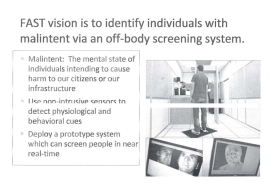In other news:
– Homeland Security’s ‘Pre-Crime’ Screening Will Never Work (The Atlantic, April 17, 2012)
– Precrime In America (ZeroHedge, April 18, 2012):
The U.S. Department of Homeland security is working on a project called FAST, the Future Attribute Screening Technology. FAST will remotely monitor physiological and behavioural signals like elevated heart rate, eye movement, body temperature, facial patterns, and body language, and analyse these signals algorithmically for statistical aberrance in an attempt to identify people with criminal or terroristic intentions.
It’s useful to briefly talk about a few of the practical problems that such a system would face.
Firstly, the level of accuracy in remote monitoring. Is it possible to engineer a system that can remotely tell you the heart-rate of a hundred passengers passing through a TSA checkpoint? Yes. Is it possible to do so accurately? That is much, much harder. The obvious conclusion is that such a system, were it to be deployed in the wilds of airports (and presumably, other locations where our ever-benevolent technocratic overlords determine “terrorists” or “criminals” may be operating) would — given a large enough number of scans — produce a lot of false positives stemming from erroneous data.

